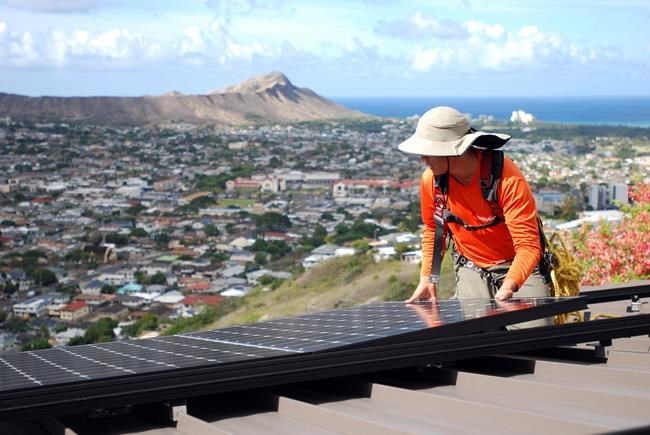
FILE - In this July 8, 2016, file photo, Dane Hew Len, lead installer for RevoluSun, places a solar panel on a roof in Honolulu. If you have the cash, most experts agree buying a solar system outright is a better investment than leasing or taking out a loan. Customers should check electric bills to estimate monthly energy use when deciding what size system to buy, and calculate federal or state incentives. (AP Photo/Cathy Bussewitz, File)
December 18, 2019 - 11:32 AM
NEW YORK - Homeowners are clamouring to power through blackouts that have become a regrettably frequent part of life in California. The cost of solar panels and batteries has fallen. And a new California law will require all new homes to produce as much energy as they consume beginning in January.
That mix of incentives has led to a surge in interest among homeowners who want to add solar arrays and batteries to their homes, and the companies offering those packages have noticed. Sunrun, which sells solar panels primarily through long-term lease agreements, in October saw traffic spike 1500% to the page on its website which explains how to power through blackouts, shortly after Pacific Gas & Electric cut power proactively to thousands of people hoping to prevent wildfires. During the October blackouts, Sunrun’s California customers with solar and battery systems kept their lights on for more than 36 hours on average, and one Sonoma County family powered their home for nearly six straight days.
“Interest has by far gone through the roof,” said Evelyn Huang, chief customer experience officer at Sunrun.
When weighing whether to buy, lease or subscribe to a solar energy system, it's worth considering whether there are hidden costs or pitfalls.
BUYING IS BEST
If you have the cash, most experts agree that buying a solar system outright is a better investment than leasing or taking out a loan. Customers should check electric bills to estimate monthly energy use when deciding what size system to buy and calculate federal or state incentives. Make efficiency upgrades such as buying new windows or energy-saving appliances before choosing a system to help avoid purchasing an array that's larger than necessary. A good solar company will help calculate the appropriate size.
Solar panels can cost $20,000 or more, and solar companies and others are increasingly offering loans to help alleviate the upfront cost. The solar loan market grew 40% in early 2019 from the same time last year, according to Wood Mackenzie.
For buyers, the sooner the better. The federal investment tax credit, which covers 30% of the cost of the system until year-end, will fall over the next two years and will expire for residential customers in 2022.
LEASES CAN SAVE MONEY, BUT BEWARE OF PITFALLS
Leasing a solar energy system may be an attractive option for people who want to use renewable energy but don't have the cash to buy a system.
Sunrun estimates that customers who lease panels save 10% to 40% on their electric bills. Customers can choose a fixed monthly rate or start out with a lower monthly payment that increases over time. Leases at Sunrun typically last about 25 years.
Lease companies also handle repairs, and "if the system doesn’t perform, the customer doesn’t pay,” said Thomas Plagemann, chief commercial officer at Vivint Solar.
But as prices fell and loan options increased in recent years, leases declined. About 28% of residential solar systems are owned by third parties, down from 62% in early 2014, according to the Solar Energy Industries Association.
“Usually it ends up being more expensive over the life of the project (to lease),” said Brett Simon, senior energy storage analyst at Wood Mackenzie. “It’s economically more efficient if you have the capital to just buy a system.”
Lease customers don't always save money, and entering into a lease agreement can complicate home sales. That was the case for Steve Hebert in Hillsboro, Oregon, who began leasing solar panels from Solar City in 2016 before the company was bought by Tesla. When Hebert recently decided to sell his house, his realtor told him it would be difficult because of the solar lease. The lease could be transferred to a potential buyer, but some wouldn't want to take it on.
Hebert tried to find out what it would cost to buy out the rest of the lease agreement and found out he wouldn't be able to buy it outright until he was five years into the contract. He wanted to find out more but had difficulty getting a Tesla representative on the phone.
“I feel like I'm probably at a wash or paying more than I was before solar,” Hebert said. “I love that I can feel good about running my AC in the summer but I regret this whole thing.”
When solar costs were very high, leases took off, but as prices have fallen leases have become less attractive, said Ricardo Rodriguez, research analyst at Navigant Research. “It just creates an extra hassle there, and especially if you just moved to your first house, you probably don’t expect to live there for 20 years," he said.
SUBSCRIBE AND SAVE?
Everything from diapers to cars can be bought with a subscription, and now you can add solar panels to the list. Tesla is among the companies offering solar subscriptions and will install a small, medium or large system on your roof which provides energy to your home for a monthly fee. Customers, who are still hooked up to their electric utility, pay for any additional electricity that they pull from the grid.
Jenny Gracia, who moves frequently as part of a military family, had solar panels installed in her California home, saving her a couple hundred dollars per month, she said.
Beware of fees to uninstall a system. Tesla was charging a $1,500 fee to remove leased solar panels, but has since stopped charging that fee, a spokesman said.
News from © The Associated Press, 2019